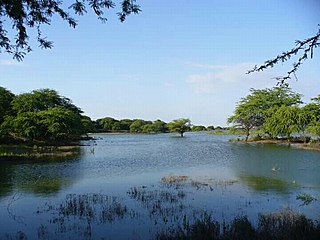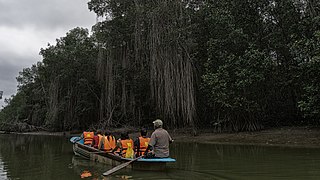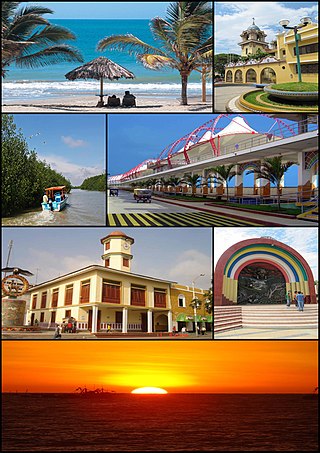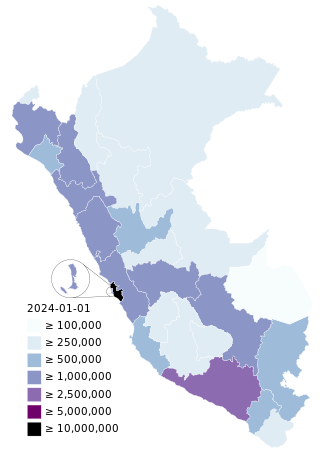
Callao is a Peruvian seaside city and region on the Pacific Ocean in the Lima metropolitan area. Callao is Peru's chief seaport and home to its main airport, Jorge Chávez International Airport. Callao municipality consists of the whole Callao Region, which is also coterminous with the Province of Callao. Founded in 1537 by the Spaniards, the city has a long naval history as one of the main ports in Latin America and the Pacific, as it was one of vital Spanish towns during the colonial era. Central Callao is about 15 km (9.3 mi) west of the Historic Centre of Lima.

Piura is a coastal department and region in northwestern Peru. The region's capital is Piura and its largest port cities, Paita and Talara, are also among the most important in Peru. The area is known for its tropical and dry beaches. It is the most populous department in Peru, its twelfth smallest department, and its fourth-most densely populated department, after Tumbes, La Libertad, and Lambayeque.

San Martín is a department and region in northern Peru. Most of the department is located in the upper part of the Peruvian Amazon rainforest. Its capital is Moyobamba and the largest city in the department is Tarapoto.

Tumbes is a coastal department and region in northwestern Peru bordering Ecuador. Due to the region's location near the Equator it has a warm climate, with beaches that are considered among the finest in Peru. Despite its small area, the region contains a wide variety of ecosystems. It is the smallest department in Peru and its third least populous department after Moquegua and Madre de Dios, but it is also its third most densely populated department, after La Libertad and Lambayeque.

Tumbes is a city in northwestern Peru, on the banks of the Tumbes River. It is the capital of the Tumbes Region, as well as of Tumbes Province and Tumbes District. Located near the border with Ecuador, Tumbes has 111,595 inhabitants as of 2015. It is served by the Cap. FAP Pedro Canga Rodriguez Airport. It is located on the Gulf of Guayaquil along with Zorritos.

The Ecuadorian–Peruvian territorial dispute was a territorial dispute between Ecuador and Peru, which, until 1928, also included Colombia. The dispute had its origins on each country's interpretation of what Real Cedulas Spain used to precisely define its colonial territories in the Americas. After independence, all of Spain's colonial territories signed and agreed to proclaim their limits in the basis of the principle of uti possidetis juris, which regarded the Spanish borders of 1810 as the borders of the new republics. However, conflicting claims and disagreements between the newly formed countries eventually escalated to the point of armed conflicts on several occasions.
Tumbes National Reserve is a protected area established in 2006 and located in the region of Tumbes, Peru; near the border with Ecuador. It spans an area of 751 km2 (290 sq mi) and along with Cerros de Amotape National Park and El Angolo Game Preserve is part of the Noroeste Biosphere Reserve designated by UNESCO.

According to the Organic Law of Regional Governments, the regions are, with the departments, the first-level administrative subdivisions of Peru. Since its 1821 independence, Peru had been divided into departments but faced the problem of increasing centralization of political and economic power in its capital, Lima.

Peru has some of the greatest biodiversity in the world. It belongs to the select group of mega diverse countries because of the presence of the Andes, Amazon rainforest, and the Pacific Ocean. It has the fourth-most tropical forests of any country and the ninth-most forest area. The country is ranked among the five countries with the greatest biodiversity in the world according to various studies.
Sporting Pizarro is a Peruvian football club, playing in the city of Tumbes, Peru.

The COVID-19 pandemic in Peru has resulted in 4,526,977 confirmed cases of COVID-19 and 220,975 deaths. The virus spread to Peru on 6 March 2020, when a 25-year-old man who had travelled to Spain, France, and the Czech Republic tested positive. On 15 March 2020, President Martín Vizcarra announced a country-wide lockdown, closing borders, restricting domestic flights, and forbidding nonessential business operations, excluding health facilities, grocery stores, pharmacies, and banks. As of May 2023, Peru has the highest COVID-19 death rate in the world, with over 6,400 deaths per one million citizens.

Manuel Arturo Merino de Lama is a Peruvian politician who briefly served as President of Peru for six days between 10 and 15 November 2020. He also served as the President of Congress from 16 March 2020 to 15 November 2020. He was a Member of Congress (AP) representing the Tumbes constituency for the 2001–2006, 2011–2016, and 2020–2021 terms.
Club Social Cultural Deportivo Cristal Tumbes is a Peruvian football club, playing in the city of Tumbes, Peru.

Club Social Sport Pampas is a Peruvian football club, playing in the city of Tumbes, Peru.

The Peruvian Guard Legion is a traditional military unit of Peru. It has participated in several conflicts since the country's independence and the unit's formation by José de San Martín in 1821. Its headquarters are located in the Real Felipe Fortress located in Callao.

Cyclone Yaku was an unusual low-pressure system in the far Southeastern Pacific that impacted Ecuador and northern Peru in early March 2023. It has been described by the National Service of Meteorology and Hydrology of Peru (SENAMHI) as an "unorganized tropical cyclone" not seen since 1983 or 1998. In Peru, the system killed at least eight, affected 49,000 people and destroyed thousands of homes.
The Regional Government of Arequipa is the regional government that represents the Department of Arequipa. It is the body with legal identity in public law and its own assets, which is in charge of the administration of provinces of the department in Peru. Its purpose is the social, cultural and economic development of its constituency. It is based in the city of Arequipa.
The Regional Government of Huánuco is the regional government that represents the Department of Huánuco. It is the body with legal identity in public law and its own assets, which is in charge of the administration of provinces of the department in Peru. Its purpose is the social, cultural and economic development of its constituency. It is based in the city of Huánuco.
The Regional Government of Piura is the regional government that represents the Department of Piura. It is the body with legal identity in public law and its own assets, which is in charge of the administration of provinces of the department in Peru. Its purpose is the social, cultural and economic development of its constituency. It is based in the city of Piura.













